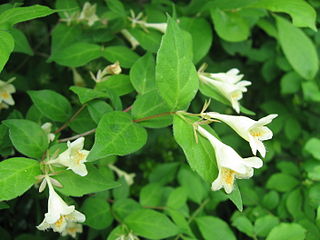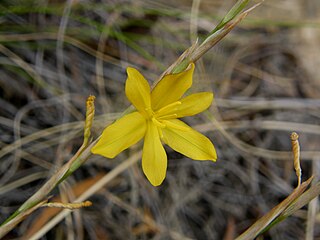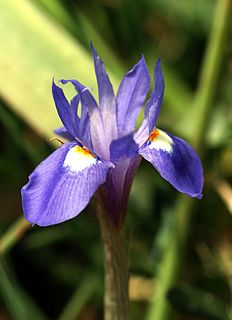
Dietes is a genus of rhizomatous plants of the family Iridaceae, first described as a genus in 1866. Common names include wood iris, fortnight lily, African iris, Japanese iris and butterfly iris, each of which may be used differently in different regions for one or more of the six species within the genus.

Nepenthes spathulata is a tropical pitcher plant native to Java and Sumatra, where it grows at elevations of between 1100 and 2900 m above sea level. The specific epithet spathulata is derived from the Latin word spathulatus, meaning "spatula shaped", and refers to the shape of the lamina.

Moraea, the Cape tulips, is a genus of plants in the family Iridaceae, first described as a genus in 1758. The group is widespread across Africa, the Mediterranean, and central and southwestern Asia. The genus name is a tribute to the English botanist Robert More.

Moraea bituminosa is a species of the genus Moraea in family Iridaceae.
Moraea vuvuzela is a plant named after the noisy trumpet, vuvuzela. Moraea is a genus of plants in the family Iridaceae.

Moraea collina is a species of the genus Moraea, in the family Iridaceae. It was formerly known as Homeria collina.

Moraea aristata is a species of flowering plant in the family Iridaceae. It is referred to by the common names blue-eyed uintjie or Blouooguintjie in Afrikaans and is a critically endangered species of plant in the genus Moraea, that is endemic to the city of Cape Town and is now restricted to the grounds of the Observatory in the Cape Town suburb of Observatory.

Swartland Shale Renosterveld is a critically endangered vegetation type of the Western Cape, South Africa.

Diplarrena moraea, commonly known as white iris, is a member of the iris family, Iridaceae. It occurs in Australian heathland and forest in New South Wales, Victoria and Tasmania.

Eucalyptus spathulata, commonly known as swamp mallet, narrow leaved gimlet or swamp gimlet, is a species of mallet that is endemic to Western Australia. It has a dense crown, smooth, satin-like bark, glossy green, linear leaves, flower buds in groups of three or seven, white flowers and cup-shaped to conical fruit.

Linnaea spathulata, synonym Abelia spathulata, is a species of Linnaea in the honeysuckle family (Caprifoliaceae). The plant is endemic to Korea and Japan.

Moraea gawleri is a species of plant in the family Iridaceae. It is found in North Cape, South Africa.

Moraea gigandra is a species of plant in the family Iridaceae. It is found in South Africa.

Moraea fugacissima is a plant species in the family Iridaceae.

Moraea virgata is a plant species in the family Iridaceae.
Persoonia spathulata is a species of flowering plant in the family Proteaceae and is endemic to the south-west of Western Australia. It is an erect to spreading shrub with hairy young branchlets, spatula-shaped leaves, and yellow flowers arranged singly or in pairs on a rachis up to 2 mm (0.079 in) long that continues to grow after flowering.

Moraea sisyrinchium, the Barbary nut, is a species of flowering plant, a dwarf iris, in the genus Moraea, native to southern Europe and the Mediterranean region.
Hakea neospathulata is a shrub of the genus Hakea in the family, Proteaceae, native to an area in the Mid West, and western Wheatbelt regions of Western Australia.

Moraea filicaulis is a flowering plant in the iris family, Iridaceae. It is endemic to South Africa where it occurs in Namaqualand, Knersvlakte, Olifants River Valley, and the West Coast. Moraea filicaulis is considered a species of least concern as it is widespread and common. It has previously been considered a subspecies of Moraea fugax.
















